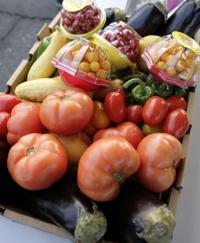The ripple effects of a leadership crisis at a Mexican grower spread over the border recently, prompting a Nogales produce distributor to ask a federal court for help.
Apache Produce Imports asked U.S. District Court in Tucson to hold on to about $1.5 million each week until ownership of International Greenhouse Produce, which grows tomatoes, cucumbers, and bell peppers in 600 acres of greenhouses in Sinaloa, is clarified.
The case has not been resolved, but it shows the role courts and regulators can play in the complex world of cross-border financing.
The confusion arose when Apache received a series of letters from IGP leadership in early December, each one casting more doubt on where Apache should send its weekly checks, according to a complaint filed Dec. 29.
The complaint says Apache is ready and willing to make the payments, but does not want to send a check to the wrong person and still end up on the hook for the original payment.
Apache’s lawyer declined to comment on the case, but court documents from Arizona and California show shareholders are suing the man who took the reins of IGP after the founder fell ill in 2012, claiming fraud and gross negligence on his part.
Growers and distributors that do not have common ownership depend in large part on cross-border financing, either by funding growing costs at the beginning of the season or through “pick and pack expense” in which the distributor wires the grower a percentage of the weekly sales.
With some companies posting more than $50 million in annual sales, sending $1.5 million to growers each week is not unusual, said David Esquivel, a commercial loan officer at the 1st Bank Yuma branch in Nogales, who has worked in cross-border produce financing since 1989.
The larger companies have lines of credit in place that range from $3 million to $5 million during the season, Esquivel said.
Nogales distributors imported 5.6 billion pounds of fruits and vegetables, worth about $2.8 billion, during the 2014-15 growing season, according to federal statistics provided by Nogales-based Fresh Produce Association of the Americas.
Nogales and Rio Rico are home to more than 100 produce importers dealing with about 1,000 growers in Mexico, which creates a “big universe of financial dealings where there are bound to be misunderstandings,” said FPAA president Lance Jungmeyer.
Jungmeyer said he did not know the specifics of the Apache case, but one way disputes arise is when ownership changes hands at Mexican growers.
Many farms in Mexico are owned by families and disputes among siblings and relatives can give rise to confusing situations for importers, Jungmeyer said.
Esquivel pointed to a dispute between Sinaloa-based Agricola San Emilio and Chiquita Fresh North America as a recent example of cross-border financing disputes.
In that case, San Emilio accused Chiquita of letting produce decay in a Nogales warehouse at a cost of more than $1 million, court records show. The two sides settled out of court.
When disputes arise, the U.S. Department of Agriculture can intervene and levy fines on either side or restrict their participation in the industry through the Perishable Agricultural Commodities Act.
USDA records show Nogales companies, like those elsewhere along the border with Mexico, have found themselves sanctioned several times in recent years for payment disputes.
Since 2012, the USDA resolved more than 4,000 claims dealing with $77 million across the country.





